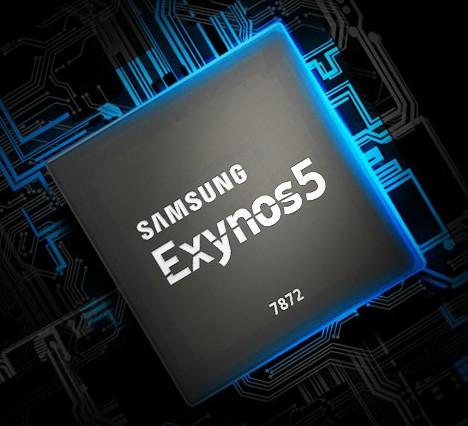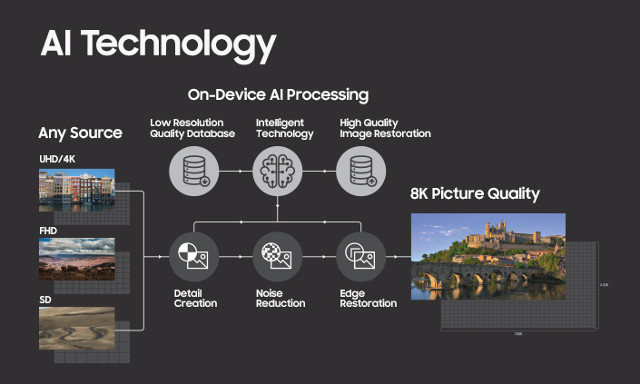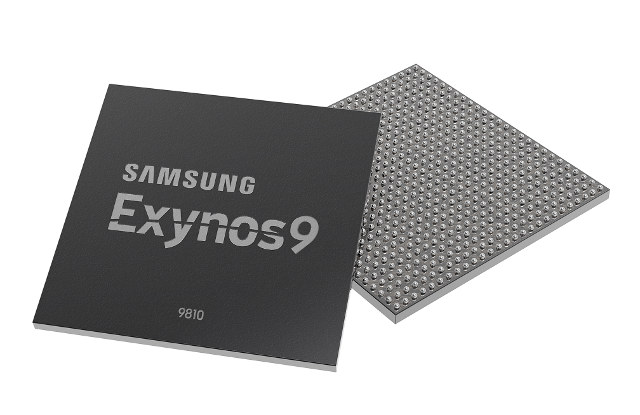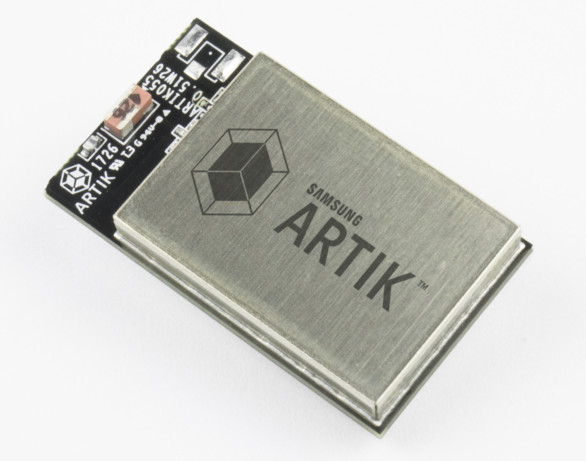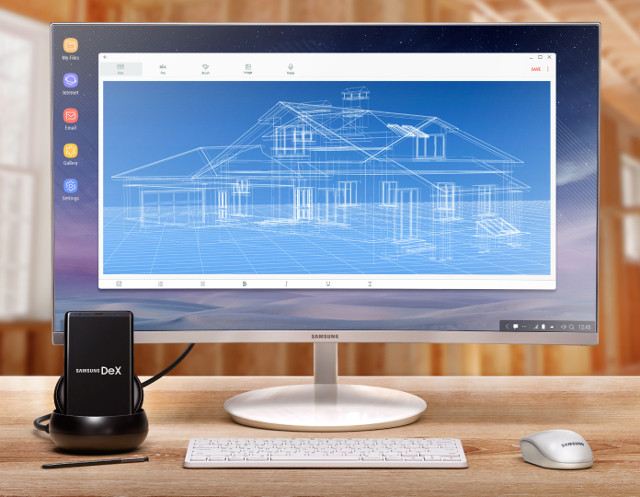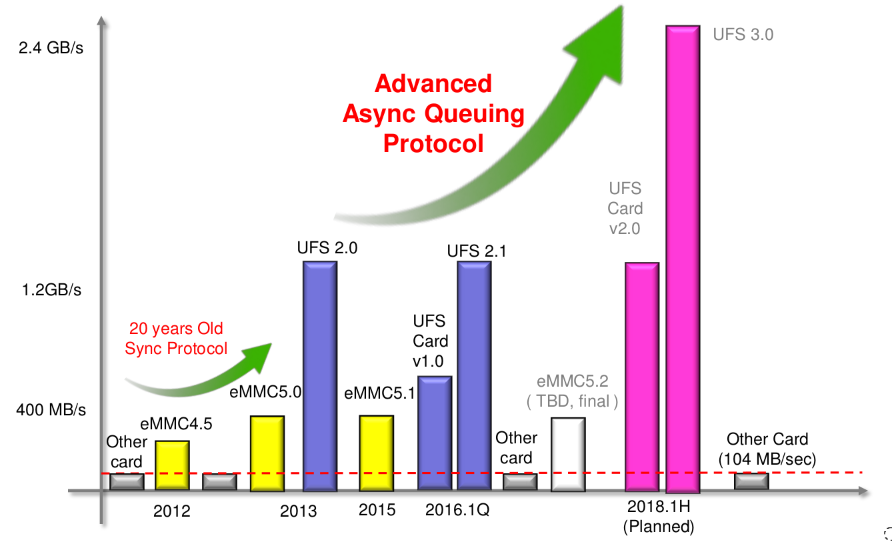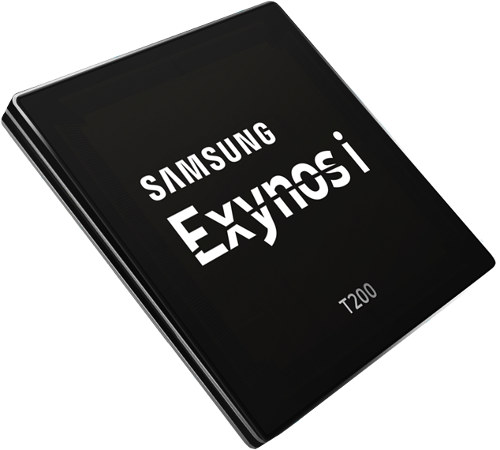Samsung has introduced a new hexa-core Exynos 5 series processor with Exynos 7872 featuring two Cortex A73 cores, four Cortex A53 cores, a Mali-G71 MP1 GPU, and an LTE modem that supports Category 7 with 2CA for 300Mbps downlink speed and Category 13 with 2CA for 150Mbps. The new processor claims to bring premium performance to mid-tier device with a doubling of single core performance compared to its predecessor, which should be Exynos 5430 or Exynos 5422 octa-core Cortex A15A/7 processor. Samsung Exynos5 7872 processor specifications: CPU – Dual-core Cortex-A73 @ up to 2.0GHz, and Quad-core Cortex-A53 @ up to 1.6GHz GPU – Arm Mali-G71 MP1 Memory I/F – LPDDR3 Storage I/F – eMMC 5.1, SD 3.0 Display – Up to WUXGA (1920×1200) LTE Modem – LTE Cat.7 2CA 300Mbps (DL) / Cat.13 2CA 150Mbps (UL) Connectivity – Wi-Fi 802.11n Dual-band, Bluetooth 5, FM Radio GNSS – GPS, GLONASS, BeiDou, Galileo […]
Samsung 8K QLED TV Uses Artificial Intelligence to Upscale SD Content to 8K Resolution
You’ve probably read how artificial intelligence can be applying to modify photos, either repair them, or change the weather in photos from sunny to rainy, and vice versa. Samsung unveiled an 85″ 8K QLED TV right before CES 2018, which should be news by itself, but that I found really intriguing is the TV’s artificial intelligence capabilities that will upscale standard and other resolution content to 8K resolution. The TV will take SD, Full HD or 4K sources runs it through machine learning algorithm to re-create details, reduce noise, and restore edges to bring them back to 8K picture quality. Not your usual “dumb” upscaling 🙂 The TV is said to be equipped with a database that studies and analyzes millions of images in advance to transform low-resolution content into high-resolution, and capable of selecting the optimal filter to convert the source to higher quality. Samsung then explains the images […]
Samsung Announces Exynos 9810 Octa-core Processor Optimized for AI and Multimedia Applications
Samsung Electronics has just announced the launch of Exynos 9 Series 9810 (Exynos 9810) manufactured with Samsung’s 10-nm FinFET process, featuring an eight core processor clocked up to 2.9 GHz, a gigabit (1.2 Gbps) LTE modem and deep learning-enhanced image processing. Single core performance is aud to be improved by two-fold, while multi-core performance gets a 40% improvement compared to the previous generation chip, which should be Exynos 8895. ARM Mali-G72 GPU is said to bring more realistic graphics along with 20% more performance. Samsung Exynos 9810 specifications with extra cache and memory info from Anandtech: CPU Quad core custom Exynos M3 @ up to 2.9GHz optimized for performance; 512KB L2 cache per core Quad-core Arm Cortex-A55 @ up to 1.9GHz optimized for efficiency; 128KB L2 cache per core GPU – Arm Mali-G72MP18 Memory – LPDDR4x (4x 16-bit @ 1794 MHz) Storage – UFS 2.1, SD 3.0 Display – Up […]
Samsung W2018 is a Premium Android Flip Phone with Dual Display for the Chinese Market
I can remember using Motorola Razr many years ago, but it’s been a long time since I’ve seen a flip phone. The must still be a market, as Samsung has just unveiled W2018 flip phone in China with many of the premium features found in their Galaxy S8 model such as Qualcomm Snapdragon 835 processor, 6GB of RAM, and up to 256 GB of storage. Samsung W2018 is also said to be the first smartphone equipped with a camera that has an F/1.5 aperture allowing for better low light photo, and the camera can switch to F/2.4 during better lighting conditions. Samsung W2018 (preliminary) specifications: SoC – Qualcomm Snapdragon 835 octa-core Kryo 280 processor up to 2.4 GHz with Adreno 540 GPU System Memory – 6GB RAM Storage – 64 GB or 256 GB storage Display – 2x 4.2″ Super AMOLED display with 1920×1080 resolution; Gorilla Glass 5 D-Pad & […]
Samsung IoT Security News – ARTIK Secure IoT Modules, SmartThings Cloud, and Secure Element
Samsung has made several announcements with IoT, especially IoT security. First, Samsung ARTIK 053, ARTIK 530 and ARTIK 710 modules are getting an “s” version, which stands for “robust security”, as well as a new ARTIK 055s module, and all ARTIK modules can now work with SmartThings Cloud uniting the company’s existing services – ARTIK Cloud and Samsung Connect Cloud – into a single IoT platform. Separately, the company announced their Secure Element solution which combines eFlash memory and new security software. Samsung ARTIK “s” modules & ARTIK 055s The company explains in their blog that ARTIK 053s, 530s, 710s, and the all new 055s will feature “advanced protection, integrated cloud services, and hosted security services with “enhanced ARTIK end-to-end security by providing greater protection for IoT data as well as prevention against hacking”. The press release is a little more specific: ARTIK secure IoT modules provide a strong root […]
Linux on Galaxy to Bring Linux Desktop to Samsung Note8, Galaxy S8 and S8+ with DeX Station
Earlier this year, Linux desktop mobile convergence took a serious hit when Canoncial decided to drop support for Unity and Mobile Convergence in their Ubuntu distributions, focusing instead on the enterprise and IoT market, and replacing Unity by GNOME starting with the just released Ubuntu 17.10. Things started to look better with Purism Librem 5 Linux smartphone, which has now raised $1.8 million dollars, and partnered with well-known members of the Linux ecosystems like KDE, GNOME, and NextCloud. However, the phone will be based on a rather low end NXP i.MX 8M quad Cortex A53 SoC, is scheduled for January 2019 only, and being a crowdfunding campaign, failure is always a possibility. But today, the outlook for Linux phones brightened even more, as Samsung unveiled plans for “Linux on Galaxy” at the Samsung Developer Conference 2017. The solution will leverage the company’s DeX (Desktop Experience) that relies on DeX Station […]
UFS 3.0 Embedded Flash to Support Full-Duplex 2.4GB/s Transfer Speeds
All my devices still rely on eMMC flash for storage, but premium smartphones, for example, make use of UFS 2.0/UFS 2.1 flash storage with performance similar to SSD, with Samsung UFS 2.0 storage achieving up to 850MB/s read speed, 260 MB/s write speed, and 50K/30K R/W IOPS. UFS 3.0 promises to roughly double the performance of UFS 2.0/2.1 with transfer rates of up to 2.4 GB/s, and separately, the UFS Card v2.0 standard should deliver UFS 2.1 performance on removable storage. Several Chinese and Taiwanese websites, including CTimes and Benchlife, have reported that companies have started getting UFS 3.0 & UFS Card v2.0 licenses from JEDEC, and Phison is working on a controller to support both new standards, and scheduled to launch in 2018. Premium smartphone SoC are only expect to support UFS 3.0 in 2019 and beyond, and hopefully by that time eMMC will have been replaced by UFS 2.0/2.1 […]
Samsung Announces Mass-Production of its Exynos i T200 WiFi Processor for the Internet of Things
Exynos i T200 is an ARM Cortex R4 + Cortex M0 WiSoC for the Internet of Things, potentially used in the Samsung ARTIK-053 IoT module, and the first Exynos IoT processor from Samsung. The company has just announced that mass production had started, so let’s have a closer look at the processor’s features. Samsung Exynos i T200 specifications: MCU Cores ARM Cortex-R4 @ 320MHz ARM Cortex-M0+ @ 320MHz (Very high frequency for an M0+ core, is that a mistake?) On-chip Memory – 1.4MB SRAM RF & WiFi Connectivity 802.11b/g/n WiFi; single band (2.4GHz) Integrated T/R switch, power amplifier, low noise amplifier Interfaces – SDIO, I2C, SPI, UART, PWM, I2S Security – WEP 64/128, WPA, WPA2, AES, TKIP, WAPI, PUF (Physically Unclonable Function) Process – 28-nanometer (nm) High-K Metal Gate (HKMG) The Cortex R4 core is used for system control, and the Cortex M0+ core for I/O and LED control. Cortex […]


